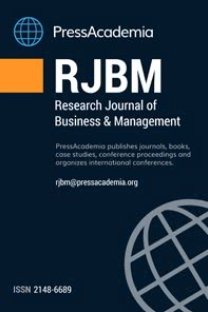COVİD-19 PANDEMİSİNİN DÜNYA MERKEZ BANKALARININ EĞİTİM VE GELİŞİM FAALİYETLERİ İLE PERFORMANS SÜREÇLERİ ÜZERİNE ETKİSİ
İnsan kaynakları yönetimi, eğitim ve geliştirme, performans yönetimi, COVID-19, merkez bankaları
THE EFFECT OF COVID-19 PANDEMIC ON TRAINING & DEVELOPMENT ACTIVITIES AND PERFORMANCE MANAGEMENT SYSTEMS IN CENTRAL BANKS
Human resources management, training and development, performance management, COVID-19, central banking,
___
- Aguinis, H., & Burgi-Tian, J. (2021). Measuring performance during crises and beyond: The Performance Promoter Score. Business Horizons, 64(1), 149-160.
- Akkermans, J., Richardson, J., & Kraimer, M. (2020). The Covid-19 crisis as a career shock: Implications for careers and vocational behavior. Journal of Vocational Behavior, 119, 103324.
- Armstrong, A. & Foley, P. (2003), "Foundations for a learning organization: organization learning mechanisms", The Learning Organization, 10(2), 74-82.
- Barutçugil, İ. (2002). Eğiticinin eğitimi: Eğitim becerilerinin geliştirilmesi. Kariyer yayıncılık.
- Bingöl, D. (2003). İnsan Kaynakları Yönetimi, Beta Yayıncılık, İstanbul.
- Bozkurt, A. (2020). Koronavirüs (Covid-19) pandemi süreci ve pandemi sonrası dünyada eğitime yönelik değerlendirmeler: Yeni normal ve yeni eğitim paradigması. Açıköğretim Uygulamaları ve Araştırmaları Dergisi, 6(3), 112-142.
- Bretz, R. D., Milkovich, G. T. & Read, W. (1992). The Current State of Performance Appraisal Research and Practice: Concerns, Directions, and Implications. Journal of Management, XVIII, 2, 321-352.
- Bui, H. T. (2019). On definitions of the learning organization: toward a new definition of learning organization. The Oxford Handbook of The Learning Organization. Oxford: Oxford University Press, 137-147.
- Bulut, C., & Culha, O. (2010). The effects of organizational training on organizational commitment. International journal of Training and Development, 14(4), 309-322.
- Carnevale, J. B., & Hatak, I. (2020). Employee adjustment and well-being in the era of COVID-19: Implications for human resource management. Journal of Business Research, 116, 183-187.
- Davies, I. C. (1999). Evaluation and performance management in government. Evaluation, 5(2), 150-159.
- Edmondson, A., & Moingeon, B. (1998). From organizational learning to the learning organization. Management Learning, 29(1), 5-20.
- Fletcher, C. & Perry, E. L. (2001). Performance Appraisal and Feedback: a Consideration of National Culture and a Review of Contemporary Research and Future Trends. (Editör: N. Anderson, D. S. Önes, H. Kepir-Sinangil, C. Viswesvaran), Handbook of Industrial, Work, and Organizational Psychology, London: Thousand Oaks, New Delhi: Sage Publications, 126-144.
- Garvin, D. A., Edmondson, A. C., & Gino, F. (2008). Is yours a learning organization?. Harvard Business Review, 86(3), 109
- Groenendaal, J., & Helsloot, I. (2021). Cyber resilience during the COVID‐19 pandemic crisis: A case study. Journal of Contingencies and Crisis Management.
- Hartle F. (1995). How to Re-Engineer Your Performance Management Process. Kogan Page Limited, London, 1995, 89.
- Herath, T., & Herath, H. S. (2020). Coping with the new normal imposed by the COVID-19 pandemic: Lessons for technology management and governance. Information Systems Management, 37(4), 277-283.
- International Monetary Fund (2017). Monetary Policy and Central Banking. International Monetary Fund Fact Sheet. Erişim adresi https://www.imf.org/en/About/Factsheets/Sheets/2016/08/01/16/20/Monetary-Policy-and-Central-Banking
- Kirilmaz, S. K., (2020). Digital transformation in human resources management: investigation of digital hrm practices of businesses. Research Journal of Business and Management (RJBM), V.7(3), 188-200.
- Kniffin, K. M., Narayanan, J., Anseel, F., Antonakis, J., Ashford, S. P., Bakker, A. B., ... & Vugt, M. V. (2021). COVID-19 and the workplace: Implications, issues, and insights for future research and action. American Psychologist, 76(1), 63.
- Martin, D. C. & Bartol, K. M. (1998). Performance Appraisal: Maintaining System Effectiveness. Public Personnel Management, XXVII, 2, 223- 230.
- Mills, D. Q., & Friesen, B. (1992). The learning organization. European Management Journal, 10(2), 146-156.
- Nutsubidze,N. & , Schmidt, D.A. (2021). Rethinking the role of HRM during COVID-19 pandemic era: Case of Kuwait. Review of Socio-Economic Perspectives, Vol 6(1), 1-12.
- Olaniyan, D. A., & Ojo, L. B. (2008). Staff training and development: A vital tool for organizational effectiveness. European journal of Scientific Research, 24(3), 326-331.
- Serifsoy, A., & Teker, S. (2020). Adaptation of the businesses not to fall behind in the new normal period. PressAcademia Procedia, 11(1), 163-167.
- Tannenbaum, S. I., & Yukl, G. (1992). Training and development in work organizations. Annual Review of Psychology, 43(1), 399-441.
- Tuna, A. A., & Çelen, O. (2020). İşletmelerin insan kaynakları yönetimi uygulamaları üzerinde COVID-19 pandemisinin etkileri. OPUS Uluslararası Toplum Araştırmaları Dergisi, 16(30), 2710-2759.
- Türkiye Cumhuriyet Merkez Bankası (2018). 100 Soruda Merkez Bankacılığı. Erişim adresi https://www.tcmb.gov.tr/wps/wcm/connect/2d9f2c1d-18eb-4124-8fd9- a4ea189a24ad/100+Soruda+TCMB+web.pdf?MOD=AJPERES&CACHEID=ROOTWORKSPACE-2d9f2c1d-18eb-4124-8fd9-a4ea189a24admR8fxaz
- Vnoučková, L. (2020). Impact of COVID-19 on human resource management. Revista Latinoamericana de Investigación Social, 3(1), 18-21.
- Yang, B., Watkins, K. E., & Marsick, V. J. (2004). The construct of the learning organization: Dimensions, measurement, and validation. Human Resource Development Quarterly, 15(1), 31-55.
- Zhao, Y. (2020). COVID-19 as a Catalyst for Educational Change. Prospects, 49(1), 29-33
- Yayın Aralığı: Yılda 4 Sayı
- Başlangıç: 2014
- Yayıncı: PressAcademia
ÇALIŞANLARDAKİ KRİPTO VARLIK PİYASASI TAKİP İSTEĞİNİN SANAL KAYTARMAYA ETKİSİ
THE IMPACT OF BUSINESS PROGRAM ACCREDITATION ON RANKING AND ENROLLMENT FOR HBCU SCHOOLS
Ljiljana Stosic MIHAJLOVIC, Svetlana TRAJKOVIC
Serdar KIZILCAN, Kagan Cenk MIZRAK
Esin Sayin YESILDAL, Rifat KAMASAK
MOBİL UYGULAMA KABUL MODELİ’NİN MOBİL BANKACILIKTA KULLANILMASI
